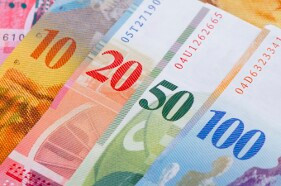The Swiss franc continues to strengthen against its most traded currency competitors to close out the trading week as the US Dollar Index slipped to a one-month low. The franc has been making gains on growing confidence in global financial markets, coronavirus vaccine hopes, and a weakening greenback. The franc is strengthening despite the central bank continuing to defend its currency interventions.
Swiss National Bank (SNB) head Thomas Jordan recently delivered a lecture on behalf of the International Monetary Fund (IMF), defending the central bankâs âessentialâ policy tool of fighting back against the francâs appreciation. Switzerland has routinely been accused of currency manipulation to boost the economy, but monetary policymakers have referred to their actions as âappropriate.â
Jordan dismissed suggestions that the SNB would further slash interest rates deeper into negative territory, arguing that you cannot cut rates forever.
Even though we still have scope for further interest-rate cuts, the fact remains that one cannot lower interest rates indefinitely. For this reason, interventions in the foreign exchange market, in which we buy foreign currencies and sell Swiss francs, also play a central role in our policy mix.
Our experience shows that foreign exchange market interventions and the negative interest rate are essential for a small open economy with a safe-haven currency in a global low interest rate environment. The combination of these two monetary policy instruments is more effective and results in fewer undesirable side effects overall than concentrating on just one of them.
Although Switzerland maintains the worldâs lowest rate of -0.75% and the central bank continues to institute franc-negative mechanisms, the currency is still approximately one-third stronger than the euro. But on its quest to erect a ceiling on the francâs ascent, the SNB has perturbed savers, banks, and the US government.
In early 2019, the Treasury Department placed Switzerland on a watchlist of possible currency manipulators.
For now, investors might be favoring the franc over the US dollar, particularly due to Americaâs unprecedented stimulus and rescue packages on both the fiscal and monetary side. Also, the greenback has been losing momentum against many of its G10 currency counterparts, mainly the euro. The US Dollar Index, which measures the buck against a basket of currencies, tumbled 0.43% to 95.91.
On the data front, producer and import prices rose 0.5% in June, up from the 0.5% decline in May. They are still down 3.5% year-over-year. Switzerland will release trade and retail sales data to finish July, as well as economic sentiment and leading indicator numbers.
The USD/CHF currency pair fell 0.8% to 0.9383, from an opening of 0.9458, at 18:57 GMT on Friday. The EUR/CHF slipped 0.29% to 1.0737, from an opening of 1.0765.
If you have any questions, comments, or opinions regarding the Swiss Franc, feel free to post them using the commentary form below.
